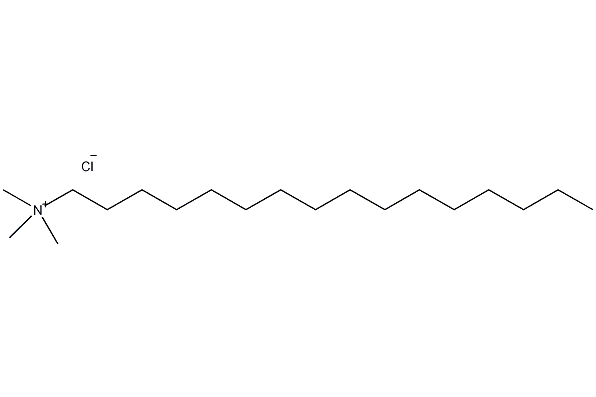
Structural formula
| Business number | 034U |
|---|---|
| Molecular formula | C19H42ClN |
| Molecular weight | 320 |
| label |
Cetane trimethyl ammonium chloride, Cetyltrimethylammonium chloride, N-Hexadecyltrimethylammonium chloride, Trimethylhexadecylammonium chloride, softener |
Numbering system
CAS number:112-02-7
MDL number:MFCD00011773
EINECS number:203-928-6
RTECS number:ML9145000
BRN number:3657974
PubChem number:24857608
Physical property data
1. Properties: white or yellowish paste or solid.
2. Density (g/mL, 30℃): 0.44
3. Relative density (20ºC/4 ºC): 0.968
4. Relative steam Density (g/mL, air=1): Undetermined
5. Melting point (ºC): 232-234
6. Boiling point (ºC, 1.33kpa): Undetermined
7. Boiling point (ºC, 5.2kPa): Undetermined
8. Refractive index: 1.377
9. Flash point (ºC): 100
10. Specific rotation (º): Undetermined
11. Autoignition point or ignition temperature (ºC): Undetermined
12. Vapor pressure (mmHg, ºC): Undetermined
13. Saturated vapor pressure (kPa, ºC): Undetermined
14. Heat of combustion (KJ/mol): Undetermined
15. Critical temperature (ºC): Undetermined
16. Critical pressure (KPa): Undetermined
17. Log value of oil-water (octanol/water) partition coefficient: Undetermined
18. Explosion upper limit (%, V/V): Undetermined
19. Explosion lower limit (%, V/V): Undetermined
20. Solubility: water-soluble.
Toxicological data
1. Acute toxicity: mouse oral LCL0: 400mg/kg; rat skin LD5O: 4300uL/kg
Ecological data
Highly toxic to fish. Irritating to eyes and corrosive.
Molecular structure data
None yet
Compute chemical data
1. Reference value for hydrophobic parameter calculation (XlogP): None
2. Number of hydrogen bond donors: 0
3. Number of hydrogen bond acceptors: 1
4. Number of rotatable chemical bonds: 15
5. Number of tautomers: none
6. Topological molecule polar surface area 0
7. Number of heavy atoms: 21
8. Surface charge: 0
9. Complexity: 181
10. Number of isotope atoms: 0
11. Determine the number of atomic stereocenters: 0
12. Uncertain number of atomic stereocenters: 0
13. Determine the number of chemical bond stereocentersNumber: 0
14. Number of uncertain chemical bond stereocenters: 0
15. Number of covalent bond units: 2
Properties and stability
1. Heat-resistant, light-resistant, strong acid and alkali resistant. Has excellent stability and biodegradability. It has good compatibility with cationic, nonionic and zwitterionic surfactants. 2. Avoid contact with oxides and moisture.
Storage method
1. Store in a cool, ventilated warehouse. Keep away from fire and heat sources. Protect from direct sunlight. Keep container tightly sealed. 2. They should be stored separately from oxidants and acids, and avoid mixed storage. Equipped with corresponding types and quantities of fire-fighting equipment. 3. The storage area should be equipped with leakage emergency treatment equipment and appropriate containment materials.
Synthesis method
1. Put 250 kg of hexadecanedimethylamine into the reaction kettle. Add 250L petroleum ether to dissolve. Pass in 47 kg of methyl chloride. Stir and heat up under sealed conditions, and azeotrope at 80°C for 1 hour. Cool, lower the temperature, reduce the pressure, add a mixed solvent of ethanol and ethyl ester at normal pressure for recrystallization, and obtain the finished product.

2.Under the catalysis of CuO/Cr2O3 catalyst with silica gel as the carrier, cetyl alcohol and dimethylamine are synthesized at a certain temperature and pressure under a certain temperature and pressure.Amine. Then use sodium hydroxide as a catalyst to react with methyl chloride to prepare cetyltrimethylammonium chloride.
Purpose
1. Used in shampoo, hair care products, architectural coatings, fabric softeners, etc.
2.In petroleum, paper making, food processing It is used as a bactericide in industrial water treatment such as textiles and textiles. It can be used as antistatic agent in natural and synthetic fibers, plastics, papermaking and other industries, as softener for leather, fiber softener, coating agent for pigments, and as emulsifier for asphalt and high-temperature resistant water-in-oil emulsified mud. Used as anti-sticking agent in the latex industry, catalyst for organic synthesis, and corrosion inhibitor for metals and alloys. It can also be used as dispersant, coagulant aid, duckweed killer, etc. It has good compatibility with cationic, nonionic and amphoteric surfactants.
3. This product is used to emulsify silicone oil, emulsifier of hair conditioner, fiber softener and antistatic agent. Softens and isolates paper and serves as a corrosion inhibitor in the pickling industry.
4.The daily chemical industry produces washing conditioners (hair rinses) and conditioners. Used as anti-sticking agent in the latex industry, catalyst for organic synthesis, and corrosion inhibitor for metals and alloys. It can also be used as a dispersant, a coagulant, a disinfectant for livestock silkworm houses, a killer for duckweed, etc.

 微信扫一扫打赏
微信扫一扫打赏

